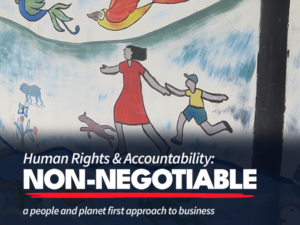Tabled: Two new bills asserting that Human Rights and Accountability are Non-negotiable

A people and planet first approach to business is long overdue. This is why KAIROS welcomes the tabling of two corporate accountability bills in the House of Commons today. These two bills seek to address deficiencies in the way Canada responds to corporate misconduct of Canada-based companies operating abroad.
With Bill C-262, Canada would adopt mandatory human rights and environmental due diligence legislation. Companies would be required to prevent human rights abuses and environmental harm, report any violations, and face significant consequences; in addition, there is a provision in the bill that would make it easier for impacted communities to access remedy through Canadian courts. This legislation would apply to Canada-based companies abroad and transnational companies operating in Canada as well as their business partners—subsidiaries and supply chains.
The passage of Bill C-263 would empower the Canadian Ombudsperson for Responsible Enterprise (CORE). Bill C-263 would grant the Ombudsperson the investigatory powers that were revoked from the office’s initial mandate. In its current form, the Ombudsperson’s mandate is limited to mediation services to Canada-based companies and communities—only after an allegation passes the CORE’s requirements of credibility. The CORE deals with matters concerning the mining, oil and gas, and garment sectors.
At a press conference organized by the Canadian Network on Corporate Accountability (CNCA) in support of the bills, Aisha Francis, Executive Director at KAIROS, stated, “the transition to clean energy must be just. Justice is not served when those affected the most by mining are chronically ignored. Patriarchy has precluded Indigenous women from decision making tables. Colonialism has made environmental racism a reality worldwide and here in Canada.”
Global partners and Canadians have been demanding that Canada impose rules for businesses, especially the extractive sector, for almost two decades—especially in the face of the gendered impacts of resource extraction.
You can still sign the CNCA’s petition to the House of Commons to show your support for a people and planet first approach to business.
The reputation of the Canadian extractive sector abroad as well as within its borders is seen as one of violator of Indigenous rights and perpetrator of gender-based violence.
Indigenous women land and water defenders report that, among countless other allegations, companies mistake consultation for consent, contaminate fresh water sources, and contribute to conflict by sowing community division and partnering with private and public security forces to quell dissent.
In response, the Government of Canada has done very little to curtail corporate negligence. Often Canada has coupled insincere actions and insufficient measures with unwavering support for companies—in the form of diplomatic support, investment aid, and tax breaks.
The rights of people and environment cannot be negotiated. It’s long overdue for Canada to pass binding corporate accountability legislation wherein human rights are central to business.
For more on corporate accountability and its gendered dimensions, visit MERE Hub, a digital platform created for and in consultation with women land and water defenders. More information on mHREDD legislation is available on the CNCA’s website and for a background on the CORE, visit the KAIROS website.
KAIROS is a member of the CNCA. Read the CNCA’s press release on the tabling of the two bills.
